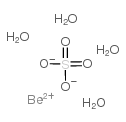Inhibition of normal human lung fibroblast growth by beryllium.
N M Lehnert, R K Gary, B L Marrone, B E Lehnert
文献索引:Toxicology 160(1-3) , 119-27, (2001)
全文:HTML全文
摘要
Inhalation of particulate beryllium (Be) and its compounds causes chronic Be disease (CBD) in a relatively small subset ( approximately 1-6%) of exposed individuals. Hallmarks of this pulmonary disease include increases in several cell types, including lung fibroblasts, that contribute to the fibrotic component of the disorder. In this regard, enhancements in cell proliferation appear to play a fundamental role in CBD development and progression. Paradoxically, however, some existing evidence suggests that Be actually has antiproliferative effects. In order to gain further information about the effects of Be on cell growth, we: (1) assessed cell proliferation and cell cycle effects of low concentrations of Be in normal human diploid fibroblasts, and (2) investigated the molecular pathway(s) by which the cell cycle disturbing effects of Be may be mediated. Treatment of human lung and skin fibroblasts with Be added in the soluble form of BeSO(4) (0.1-100 microM) caused inhibitions of their growth in culture in a concentration-dependent manner. Such growth inhibition was found to persist, even after cells were further cultured in Be(2+)-free medium. Flow cytometric analyses of cellular DNA labeled with the DNA-binding fluorochrome DAPI revealed that Be causes a G(0)-G(1)/pre-S phase arrest. Western blot analyses indicated that the Be-induced G(0)-G(1)/pre-S phase arrest involves elevations in TP53 (p53) and the cyclin-dependent kinase inhibitor CDKN1A (p21(Waf-1,Cip1)). That Be at low concentrations inhibits the growth of normal human fibroblasts suggests the possibility of the existence of abnormal cell cycle inhibitory responses to Be in individuals who are sensitive to the metal and ultimately develop CBD.
相关化合物
| 结构式 | 名称/CAS号 | 分子式 | 全部文献 |
|---|---|---|---|
 |
硫酸铍
CAS:7787-56-6 |
BeH8O8S |
|
[Diagnosis of chronic berylliosis].
1999-04-01 [Pneumologie 53(4) , 193-8, (1999)] |
|
Beryllium-stimulated release of tumor necrosis factor-alpha,...
1997-12-01 [Am. J. Respir. Crit. Care Med. 156(6) , 1884-91, (1997)] |
|
Target organ localization of memory CD4(+) T cells in patien...
2002-11-01 [J. Clin. Invest. 110(10) , 1473-82, (2002)] |
|
Beryllium presentation to CD4+ T cells underlies disease-sus...
2000-11-07 [Proc. Natl. Acad. Sci. U. S. A. 97(23) , 12717-22, (2000)] |
|
Divergent effect of cobalt and beryllium salts on the fate o...
2011-02-01 [Toxicol. Sci. 119(2) , 257-69, (2011)] |